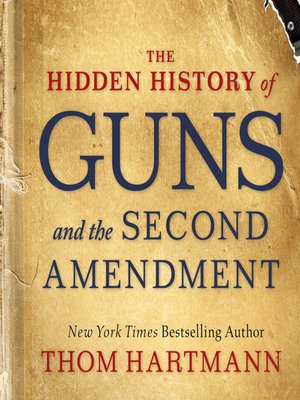The Hidden History of Guns and the Second Amendment
audiobook (Unabridged) ∣ Thom Hartmann Hidden History
By Thom Hartmann

Sign up to save your library
With an OverDrive account, you can save your favorite libraries for at-a-glance information about availability. Find out more about OverDrive accounts.
Find this title in Libby, the library reading app by OverDrive.



Search for a digital library with this title
Title found at these libraries:
| Library Name | Distance |
|---|---|
| Loading... |
"In this precise primer on firearms practices and policies, progressive talk-show host Hartmann examines the history of routine gun usage and extreme gun violence and assesses the influence of gun ownership on contemporary political, economic, and social norms...A brief but powerful analysis of a searing national crisis." -Booklist
Taking his typically in-depth, historically informed view, Thom Hartmann examines how guns have played important roles throughout American history, from early European settlement to the Revolutionary War and Manifest Destiny, through the use of Slave Patrols in the Deep South (which became the "well-regulated militias" so debated in 1787), to the assassination of John F. Kennedy and recent school massacres.
Looking at the present, Hartmann documents how inequality in America and the number of people killed in mass shootings have grown together over the last fifty years. Finally, he identifies a handful of common-sense and powerful solutions that would address the issue at different levels: from getting money out of politics to get the National Rifle Association out of lobbying, to passing laws that would treat gun ownership like car ownership (title, license, insurance), to addressing the social despair and economic inequality that drive violent crime and mass shootings.
Taking his typically in-depth, historically informed view, Thom Hartmann examines how guns have played important roles throughout American history, from early European settlement to the Revolutionary War and Manifest Destiny, through the use of Slave Patrols in the Deep South (which became the "well-regulated militias" so debated in 1787), to the assassination of John F. Kennedy and recent school massacres.
Looking at the present, Hartmann documents how inequality in America and the number of people killed in mass shootings have grown together over the last fifty years. Finally, he identifies a handful of common-sense and powerful solutions that would address the issue at different levels: from getting money out of politics to get the National Rifle Association out of lobbying, to passing laws that would treat gun ownership like car ownership (title, license, insurance), to addressing the social despair and economic inequality that drive violent crime and mass shootings.







